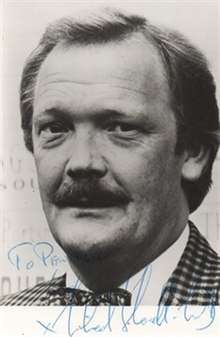Michael Sharvell-Martin
Michael Sharvell-Martin (2 February 1944 – 28 October 2010)[1] was a popular British television and stage actor whose career spanned more than three decades.[2] He was a familiar character actor on British television screens, guest starring in several prime time dramas and comedies during the 1970s and 1980s.[3]
Michael Sharvell-Martin | |
|---|---|
 | |
| Born | Michael Ernest Martin 2 February 1944 |
| Died | 28 October 2010 (aged 66) |
| Occupation | Actor |
| Spouse(s) | Linda Hind (1967–2010; his death); 2 children |
Early life
Sharvell-Martin was born Michael Ernest Martin in Herne Bay, Kent, and trained in stage management at the Bristol Old Vic Theatre School.[4] His acting debut was in 1965 at the Everyman Theatre, Cheltenham. He adopted the stage name Michael Sharvell-Martin because there was already an actor called Michael Martin.[1]
Career
Sharvell-Martin was mainly a supporting cast actor and is best remembered for his many appearances in the long-running television series Dave Allen at Large.[5] He also had a recurring role as Trevor Botting in the television situation comedy No Place Like Home.[6] During his career he made numerous guest appearances in television programmes such as The Benny Hill Show, Dad's Army, Terry and June, Yes Minister and Murder Most Horrid. He also appeared in two episodes of the BBC's department store sitcom Are You Being Served? in the 1980s.[7]
His stage appearances included several West End comedy farces and numerous pantomime roles.[7]
Selected filmography
- Quest for Love (1971) - Says "Hello Trafford" (uncredited)
- That's Your Funeral (1972) - 1st Policeman (Motorway)
- Ooh... You Are Awful (1972) - Jackson (uncredited)
- Go for a Take (1972) - Leopard Man' Director
- Rentadick (1972) - Removal Man
- Kadoyng (1972) - Pander - Willoughby
- The Love Ban (1973) - Bra Factory Designer
- Love Thy Neighbour (1973) - Police Constable
- The Best of Benny Hill (1974) - Lower Tidmarsh Hospital Doctor / Rev. Peter Wilby / Various
- Frightmare (1974) - Barman
- Not Now, Comrade (1976) - 2nd Russian Official
- No Place Like Home (1983-1988) - Trevor Bolting
Personal life
Sharvell-Martin married Linda Hind in 1967 and the couple had two daughters. In the early part of 2010 he was diagnosed with cancer of the oesophagus and died on 28 October 2010 at Wincanton, Somerset.[1]
References
- "Michael Sharvell-Martin: Perennial supporting actor who worked with Benny Hill, Dave Allen and Les Dawson". The Independent. 13 December 2010.
- "Michael Sharvell Martin - Theatricalia". theatricalia.com.
- "Michael Sharvell-Martin". BFI.
- "PressReader.com - Connecting People Through News". www.pressreader.com.
- "Dave Allen at Large[24/04/78] (1978)". BFI.
- "No Place Like Home - S4 - Episode 3: Sons and Lovers". Radio Times.
- Stage, The (15 November 2010). "Michael Sharvell-Martin - Obituaries".